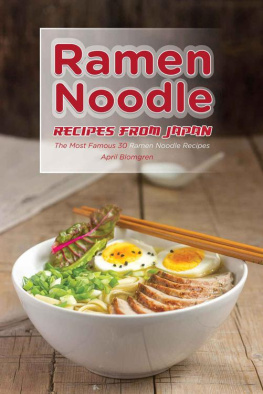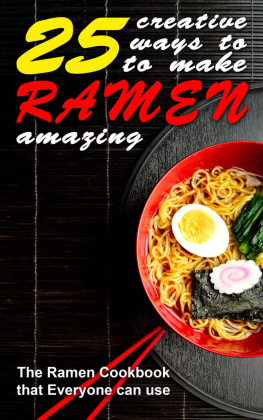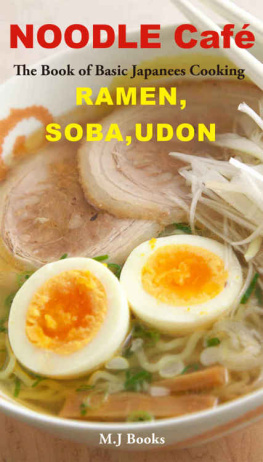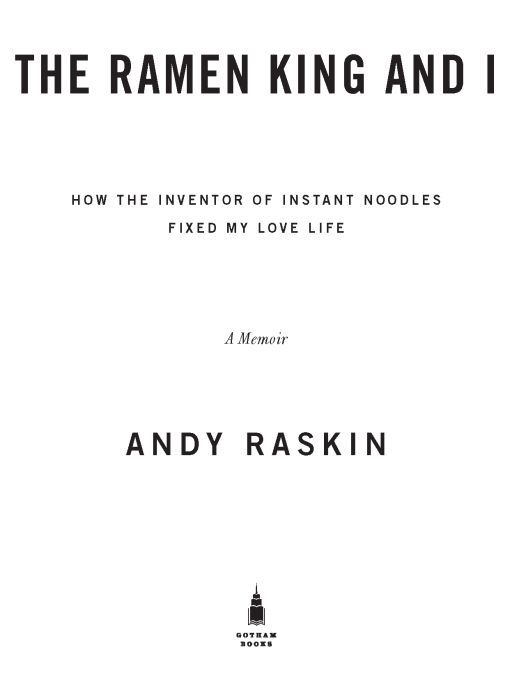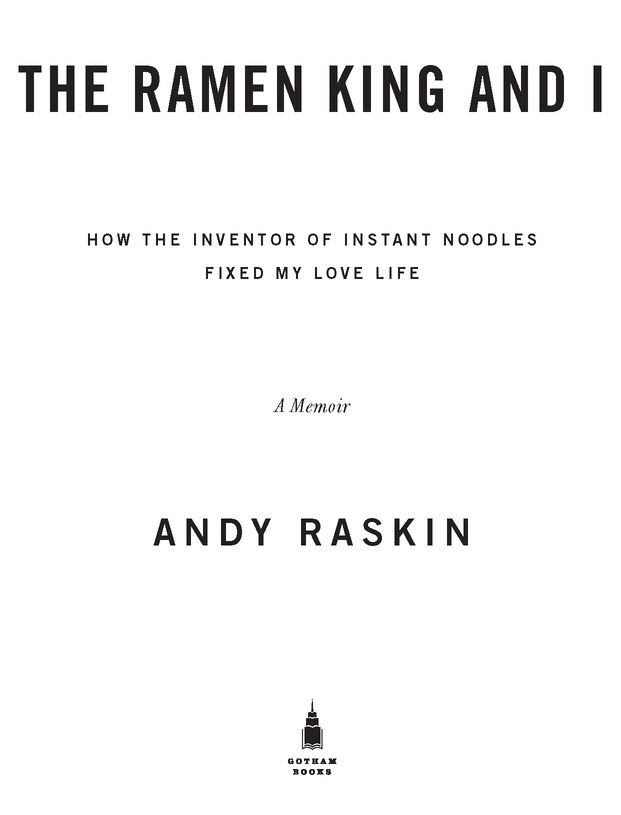Table of Contents
FOR MY FAMILY,
WITH THANKS TO CAROL WASSERMAN
PROLOGUE
It is said that real human nature reveals itself under extreme conditions. As I starved in prison, I realized that eating was one of the highest forms of human activity. Perhaps I have to go back this far to trace the origins of the development of instant noodles, though I did not have the slightest idea for Chikin [sic] Ramen at the time.
Momofuku Ando, Magic Noodles: The Story of the Invention of Instant Ramen
There used to be a Japanese TV show in which two young hostsa male and a femalewould scream, I wanna ___! They always filled in the blank with some crazy thing, like sing a duet with Yasir Arafat! Then they would go out into the world and try to do what they screamed about, with one catch. They had to go apo nashiwithout an appointment.
Among the shows best-known episodes were I wanna eat Akashi-style dumplings with United Nations representative Yasushi Akashi!; I wanna officially change my first name, in honor of the Barcelona Summer Olympics, to Barcelona!; and I wanna get treated to sushi by the wife of the manager of the Hanshin Tigers baseball team! In their most famous adventure, the hosts screamed, I wanna trim Prime Minister Murayamas eyebrows! and Japans then highest officialan aging member of the Socialist Partylet them do it.
I was thinking of that show as the train sped from Kansai International Airport toward downtown Osaka, birthplace of Nissin Food Products. I was certainly arriving apo nashi. It had been two months since Mr. Yamazaki, a low-level employee in Nissins public relations department, stopped answering my e-mails. His silence suggested that there was very little chance I would get to meet Momofuku Ando, the ninety-four-year-old billionaire who, in 1958, invented instant ramen in his backyard.
As for why I wanted to meet Ando, I wasnt entirely sure. I suspected, though, that it had something to do with my love life.
PART I
LETTERS TO ANDO
I should be thinner. I should do yoga. I should be married like the people in the New York Times wedding announcements. I should be richer. I should be able to hit higher notes on the trombone, given that I have been playing the instrument for more than thirty years. I should be more discreet.
I should live closer to my parents so I can spend time with them, because one day they will die and I will feel more alone than I can imagine.
I should not be so concerned with my parents, given how old I am.
I should eliminate processed sugars from my diet. I should find great parking spots, the way my father always does. I should be less afraid. I should call my sister more. I should reestablish contact with my high school friends Dan and Dave and Sam, because if I ever do get married, Ill have few old friends at the wedding, but mostly because I miss them.
I should not write about the letters.
I should be in the moment. I should be taller. I should employ more adverbs and similes, and rely less on anaphora. I should own a big house on Belvedere Street and decorate it for Halloween. I should glide on the dance floor. I should have no cavities.
On Saturdays, when playing Ultimate Frisbee in the park, I should make smart throws and spectacular diving catches. I should not want attention or validation. I should give things another shot. I should be more organized.
When Grandpa Herman bought me the Partridge Family album for my tenth birthday, I should not have cried because it was not the album with I Think I Love You on it. I should be friendlier with the guys who run the body shop. I should keep things under wraps. I should not be suffering from what the inventor of instant ramen identifiedjust prior to inventing instant ramenas the Fundamental Misunderstanding of Humanity.
Because then there wouldnt be so many shoulds.
But there you are.
I should start in Uji City, on January 2, 2007.
Blessed by a stunning mountain landscape and famous for its fragrant green tea, Uji City is situated midway between Japans ancient capitals Kyoto and Nara. The region is home to Byodo-in, the 950-year-old Buddhist temple that decorates the back of the ten-yen coin, and to the tourist destinations known collectively as the Ten Spots, each in some way associated with one of the final ten chapters of The Tale of Genji.
On January 2, 2007, three days and two months shy of his ninety-seventh birthday, Momofuku Ando played a round of golf in Uji, at the Nissin Miyako Country Club. The inventor of instant ramen shot a 10956 on the front nine, 53 on the back. He founded the club himself, he once said, due to my earnest desire to pursue golf as my hobby and to enjoy the game to my hearts content. In fact,
Thus Spake Momofuku, a published collection of Andos famous utterances, contains no fewer than twelve sayings about golf, including:
As far as Im concerned, eighteen holes is the only happiness that money can buy.
Dont worry. If Im playing, the rain will stop.
To be on a golf course when I diethat is my true desire.
Two days later, Ando gave a speech at the Osaka headquarters of Nissin Food Products, the instant noodle empire he had launched nearly fifty years earlier. He addressed an assembly of Nissin employees for thirty minutes and enjoyed a serving of Chikin Ramen in the company cafeteria. Expressing his desire for peace in the world, he unveiled a slogan for the New Year. His practice of coining, brush drawing, and officially unveiling New Year slogans dates back to 1964. Because the slogans were often somewhat cryptic, Nissins public relations department began issuing official explanations in 1986.
Andos slogan for 2007 was Kigyo Zainin, Seigyo Zaiten.
According to the official explanation, it meant that a company can be built by humans, but its success will always depend on God.
The next day, Ando suffered an unusually high fever. He was rushed to a hospital, where his wife, Masako, and several Nissin executives stood at his bedside. He was not on a golf course when his heart stopped beating, but at least he had played very recently.
In the weeks that followed, newspapers and blogs hailed Ando as a food pioneer. Many obituaries cited the number eighty-six billion, which was how many servings of instant ramen had been consumed on Earth in 2005, the most recent year for which data on worldwide demand was then available. Some journalists did the math: nearly twelve bowls for every person on the planet. An airline pilot who blogged on Salon.com declared, The aviation world was rocked by the news, explaining that he carried five packages of instant ramen on every flight. Another blogger joked that mourners might pour boiling water into Andos casket, turning down the lid for three minutes. The Economist ran a story on Andos death. So did Time magazine. For three days the most e-mailed article on the New York Times Web site was an opinion piece by Lawrence Downes titled Appreciations: Mr. Noodle. It began, The news last Friday of the death of the ramen noodle guy surprised those of us who never suspected that there was such an individual.
I laughed when I read the Times piece. I laughed because I was not a person who never suspected there was an inventor of instant ramen. Here are excerpts from e-mails I received in the wake of An-dos death:


